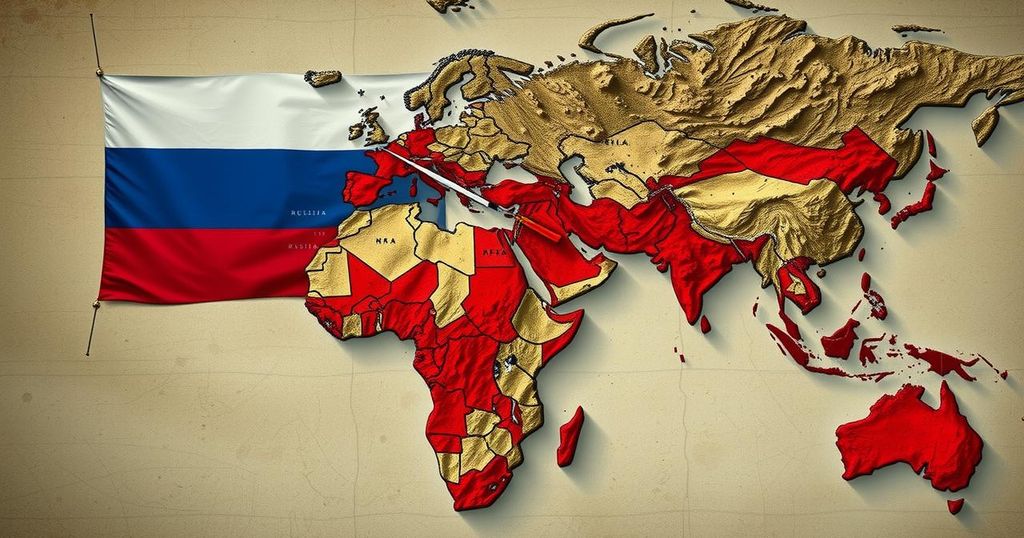Shattered Illusions: The Collapse of Russian Influence from Syria to Africa
Russia’s military failures in Syria have significantly weakened its standing and credibility in Africa. The loss of critical military bases threatens support for Moscow’s African operations, prompting local leaders to reconsider their reliance on Russia. As Moscow seeks to navigate the fallout from Syria, its future influence in Africa hangs in the balance, necessitating strategic adaptations to ensure continued partnerships.
The recent upheaval in Syria has fundamentally undermined Russia’s perceived strength and influence in Africa. Following the fall of Bashar al-Assad and subsequent military overreach in Ukraine, Russia’s failure to safeguard its primary ally in the Middle East raises serious questions regarding its regional power. The decline of Russian military infrastructure in Syria, especially the strategic Tartus and Khmeimim bases, threatens logistical support for Russian operations across Africa, where they have sought to extend their influence through military and economic partnerships with various African nations. Previous engagements have relied heavily on Syria as a supply route for arms and military personnel, lending urgency to the Kremlin’s need to maintain a foothold in the region. However, with the losses incurred in Syria, Moscow’s ability to project power and foster strategic alliances in Africa is now in jeopardy.
Russia’s military interventions, particularly in Libya and Mali, hinged on the operational support derived from its presence in Syria. Should this support be disrupted, rival powers within Africa might reconsider their alignment with Moscow, fostering a sense of insecurity among those who have depended on Russia as a counterbalance to Western influences. Consequently, the Kremlin’s failure in Syria has initiated a worrying reassessment among African leaders of Russia’s reliability as a defender against external threats
As the situation in Syria evolves, Russia is considering its choices: either negotiate with the new Syrian authorities to retain access to vital bases or risk further isolation from African partners. The military engagement model employed in Syria was marketed effectively, presenting Russia as a reliable ally against terrorism. However, the upheaval in Syria and Russia’s increasing military overstretch raise doubts about its future role as a security provider in Africa.
Russia must now consider alternative strategies to reaffirm its presence in Africa, perhaps by strengthening relationships with regional actors or adjusting its military support frameworks. This need for adaptation is underscored by the broader geopolitical shifts occurring as African nations re-evaluate their security partnerships amid Russia’s faltering military status.
Ultimately, the collapse of Russian authority in Syria signifies not only a loss in military terms but also a critical blow to its soft power and global aspirations. Moscow’s ability to maintain its alliances and strategic footholds, particularly in Africa, will depend greatly on how it navigates the fallout from Syria and adjusts to the evolving geopolitical landscape in the region.
The article analyzes the implications of Russia’s changing military presence in Syria and its impact on Russia’s influence in Africa. The loss of military bases and logistical support in Syria serves as a significant setback for Russia, which had used its Syrian infrastructure as a means to project power into various parts of Africa. Additionally, the Kremlin’s previous military engagements in Africa relied on logistical ties to Syria for arms supplies and personnel rotations. The article discusses how the fall of Assad has prompted African leaders to reassess their relationship with Russia amidst changing geopolitics.
In conclusion, the upheaval surrounding Assad’s regime in Syria has severely undermined Russia’s credibility and influence in Africa. The disruption of military logistics and support systems linked to Syria raises substantive concerns regarding Russia’s role as a security partner for African states. As these countries reflect on their strategic alliances, Russia’s ability to maintain its foothold in the continent will depend on its adaptive strategies in response to these shifting dynamics.
Original Source: foreignpolicy.com




Post Comment